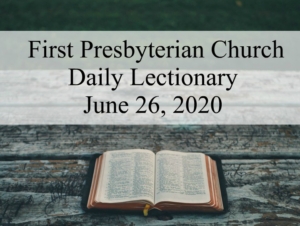
Gospel Reading Matthew 20:29-34
Numbers 20:1-13
1The Israelites, the whole congregation, came into the wilderness of Zin in the first month, and the people stayed in Kadesh. Miriam died there, and was buried there.
2Now there was no water for the congregation; so they gathered together against Moses and against Aaron. 3The people quarreled with Moses and said, “Would that we had died when our kindred died before the LORD! 4Why have you brought the assembly of the LORD into this wilderness for us and our livestock to die here? 5Why have you brought us up out of Egypt, to bring us to this wretched place? It is no place for grain, or figs, or vines, or pomegranates; and there is no water to drink.” 6Then Moses and Aaron went away from the assembly to the entrance of the tent of meeting; they fell on their faces, and the glory of the LORD appeared to them. 7The LORD spoke to Moses, saying: 8Take the staff, and assemble the congregation, you and your brother Aaron, and command the rock before their eyes to yield its water. Thus you shall bring water out of the rock for them; thus you shall provide drink for the congregation and their livestock.
9So Moses took the staff from before the LORD, as he had commanded him. 10Moses and Aaron gathered the assembly together before the rock, and he said to them, “Listen, you rebels, shall we bring water for you out of this rock?” 11Then Moses lifted up his hand and struck the rock twice with his staff; water came out abundantly, and the congregation and their livestock drank. 12But the LORD said to Moses and Aaron, “Because you did not trust in me, to show my holiness before the eyes of the Israelites, therefore you shall not bring this assembly into the land that I have given them.” 13These are the waters of Meribah, where the people of Israel quarreled with the LORD, and by which he showed his holiness.
The Israelites are complaining (again). This time they’re thirsty; and they’re remembering all of the things they want but can’t get: grain, figs, vines, pomegranates. Their vision of life with God has not included the luxuries they hope for, so they do what any of us would do when we’re dissatisfied with the way things are—they complain. By this point on the trip Moses knows what to do. He goes to the tent of meeting. He doesn’t even need to say anything. God promises that water will spring from a rock. Moses, obviously frustrated, calls the Israelites rebels; and without waiting for an answer to their question (Do they want him to bring water from a rock? Of course they do!) Moses strikes the rock and water flows. The people are saved (again). The cycle of complaint—the people complain, Moses’ frustration, God’s frustration, God’s salvation—repeats. Each time the people have to learn that God will provide: that God’s action even precedes the answer to their questions. Eventually the people stop complaining and they learn the right way to talk to God, which is in prayer. The difference between complaining and prayer is subtle, maybe as subtle as the expectation that God is already at work. When we’re tired with the way things are going, fed up with quarantine, exhausted by the news, it’s tempting to complain. The experience of Israel suggests we might try praying instead.
God, hear us in our asking, our wondering, our wandering after your grace. You promise to meet us in just those places; help us to see and to trust that you are there, before us, waiting with grace before we even ask. We pray in Christ’s name. Amen.

Get Social